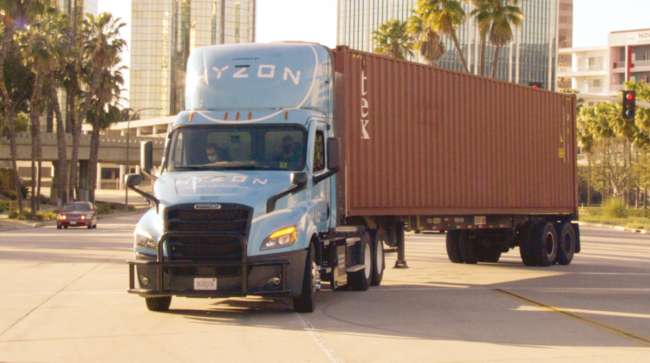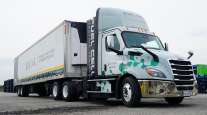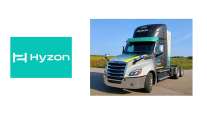Staff Reporter
Hyzon Q3 Loss Narrows; Hunt for Funding, Tie-Ups Accelerates

[Stay on top of transportation news: Get TTNews in your inbox.]
Losses at Hyzon narrowed in the third quarter of 2024, but the hydrogen fuel cell electric truck maker’s cash reserves continue to erode rapidly.
Hyzon posted a loss of $41.32 million, or $7.74 per diluted share in Q3, down 6.2% from $44.06 million, $8.99, in the year-ago period.
Bolingbrook, Ill.-based Hyzon’s cash, cash equivalents and short-term investments on hand at the end of the most recent quarter totaled $30.4 million, compared with $55.1 million three months earlier and $112.3 million at the start of the year.
As a result, the company’s executives said during a Q3 earnings presentation to analysts that they are looking to raise more funds through the capital markets or obtaining strategic investments.
Hyzon is revolutionizing industries with hydrogen fuel cell technology! We deliver zero-emissions power for tough jobs, starting with commercial trucking. Hydrogen is powerful, accessible, and found everywhere—from water to waste. Refuel in the same time as diesel! pic.twitter.com/unxh6XhgD9 — Hyzon (@hyzon) November 8, 2024
Hyzon raised $4.5 million in working capital in July, but the company’s financial straits have become more dire since then, when it warned that layoffs and filing for bankruptcy protection were possibilities.
In late June, Hyzon hired investment house PJT Partners to carry out an operational review, raise funds and explore the sale of all or part of its assets as it sought to cut costs and slow its cash drain. PJT’s first conclusions from the review emerged in early July, with Hyzon announcing July 8 the shuttering of operations in the Netherlands and Australia.
When releasing its Q3 earnings Nov. 13, Hyzon said the winding down of its Australian and Dutch operations was largely complete.
Company officials remain optimistic publicly.
“I am pleased with the significant commercial and operational progress we have made this year while simultaneously reducing our [spending],” Chief Financial Officer Stephen Weiland said.
Meet the Hyzon HYHD8 200kW – redefining heavy-duty with zero-emission power! Delivering up to 200kW of hydrogen fuel cell energy, this truck is built to perform sustainably and tackle the toughest jobs. Learn more: https://t.co/RvvafpdHQs #Hyzon #CleanEnergy #ZeroEmissions pic.twitter.com/CiNucUN4cM — Hyzon (@hyzon) November 5, 2024
“We began 2023 with an average monthly net cash burn in excess of $15 million, and through intentional, strategic actions we now have line of sight to a $6.5 million monthly cash burn by year-end. This was enabled through operational efficiencies, footprint rationalization and cost take-outs,” he added.
On the other side of the balance sheet, Hyzon’s revenue pipeline is starting to show signs of increasing flows.
Host Seth Clevenger and Features Coordinator Mike Senatore take you behind the scenes to unveil the 2024 Top 50 Global Freight Companies. Tune in above or by going to RoadSigns.ttnews.com.
Trials of prototypes of the company’s 200-kilowatt Class 8 tractor and refuse truck began in July. Thus far, 10 trials have been completed, and Hyzon is in commercial negotiations with the majority of these parties for potential orders, the company said.
The trial program will continue to expand, Hyzon said, with more than 30 fleets scheduled to carry out testing through February.
Hyzon secured a purchase agreement for 12 refuse trucks from GreenWaste in October, although the order is contingent upon Hyzon meeting certain commercial terms and specifications. Hyzon said the trucks could be delivered as early as the fourth quarter of 2025.

Meeks
“The third quarter marked the next inflection point in Hyzon’s evolution, completing significant milestones that we previously committed to on the commercial, technical and financial front,” CEO Parker Meeks said. “These achievements mark a pivotal moment in Hyzon’s journey and the broader transition to zero-emission transportation, which is now in active commercialization.”
Hyzon began series production of its 200-kW Class 8 tractor Sept. 16. Production initially will take place at a Fontaine Modification facility in Charlotte, N.C.
The company intends to provide Fontaine with kits for the fuel cell system, battery packs and hydrogen storage systems. Fontaine adds these onto vehicle chassis. The current base chassis for Hyzon’s truck is a Freightliner Cascadia in two day-cab variants.
Hyzon’s milestones continued into the current quarter. On Oct. 8, the company began series production in Bolingbrook of the 200-kW fuel cell system set to power its trucks. The Bolingbrook facility will be able to produce 700 fuel cell systems a year on a three-shift basis.
Want more news? Listen to today's daily briefing below or go here for more info:





